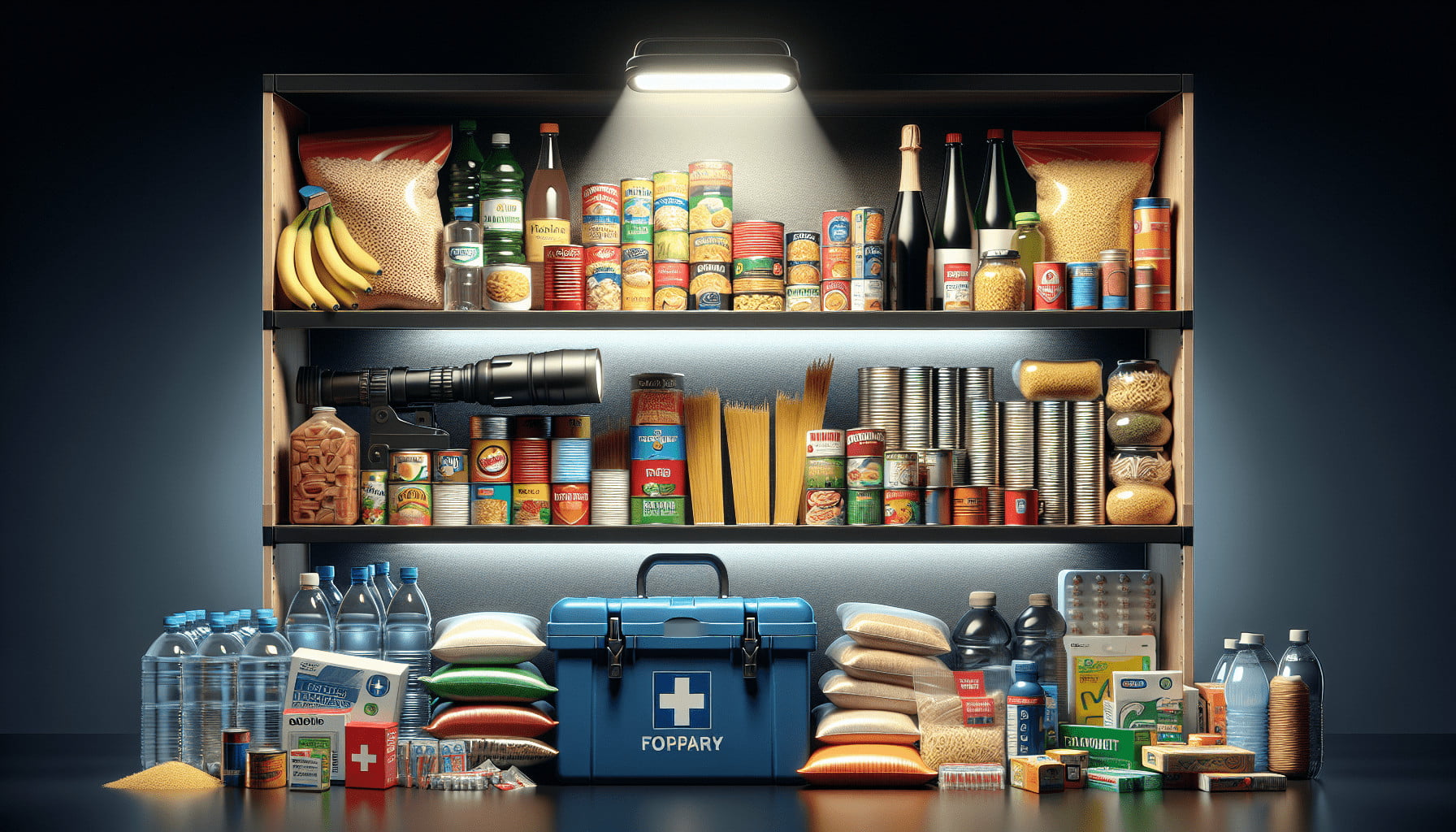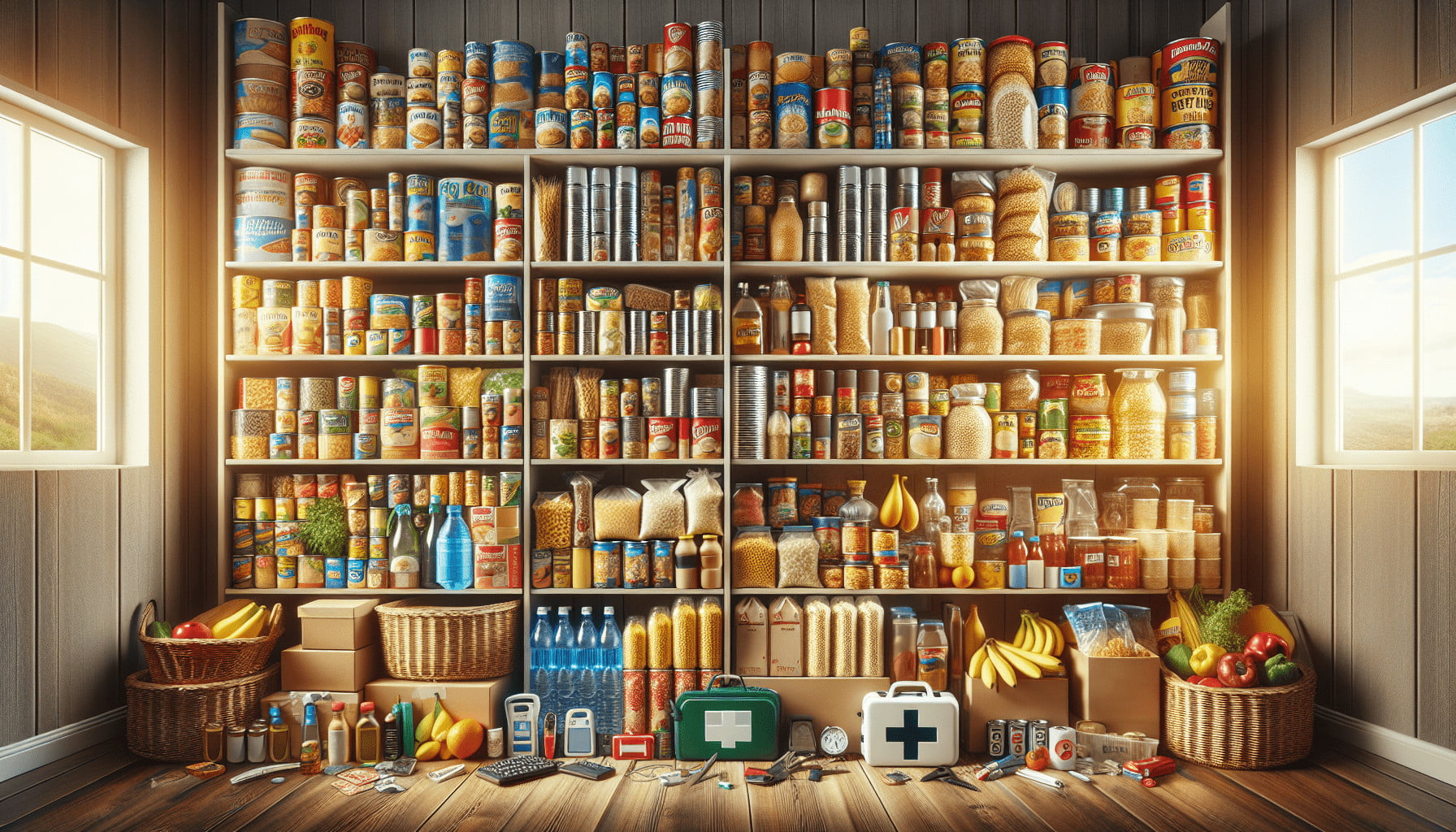When it comes to preparing for the unexpected, having a well-thought-out plan for stockpiling emergency food and supplies can make all the difference. Imagine having peace of mind, knowing that your family will remain safe and nourished in any crisis. From selecting non-perishable foods to organizing your supply space efficiently, this guide will walk you through the practical steps to ensure you’re ready for whatever comes your way. Dive in to learn the best strategies for creating a reliable and accessible emergency stockpile. Have you ever wondered how you’d fare in the event of a natural disaster, a prolonged power outage, or even just a period of financial uncertainty? Let’s face it: life’s unpredictable, and having a plan in place can make all the difference. That’s why stockpiling emergency food and supplies isn’t just for the “doomsday preppers” anymore; it’s a smart move you might want to consider. Don’t worry, you won’t need a secret underground bunker or a year’s worth of food. Just some savvy planning and a bit of common sense can go a long way.
So, shall we dive into the best ways to stockpile emergency food and supplies?

Why Stockpiling is Essential
Peace of Mind
The primary benefit of having a stockpile is peace of mind. Knowing that you and your loved ones won’t go hungry or lack basic necessities during a crisis can help reduce stress and anxiety.
Self-Reliance
Imagine being cut off from grocery stores, pharmacies, or even gas stations. With a well-thought-out stockpile, you can rely on yourself rather than external support systems that might be overwhelmed or unavailable.
Financial Wisdom
Stockpiling can also serve as a financial cushion. Buying essentials in bulk when prices are low allows you to save money in the long run.
Assessing Your Needs
Family Size and Dietary Requirements
Consider how many people you’re stocking up for and any specific dietary needs. Allergies, vegetarian preferences, and medical conditions should guide your choices.
Length of Stockpile
Are you preparing for a short-term power outage or something more extended like a natural disaster? Knowing the scope will help you gauge how much to stockpile.
Space and Storage
Where will you store your supplies? Utilize closets, basements, and even under-the-bed storage to maximize space. Keep in mind that temperature and humidity can affect the longevity of certain items.
Food Stockpiling
The Basics: Staples You Should Have
Here’s a straightforward table to help you visualize what staples to stockpile:
| Food Category | Examples | Shelf Life |
|---|---|---|
| Grains | Rice, Oats, Pasta | 1-2 years (dry) |
| Proteins | Canned Beans, Lentils | 2-5 years |
| Canned Goods | Vegetables, Fish, Meats | 1-5 years |
| Snacks | Nuts, Dried Fruits | 1-2 years |
| Baking Needs | Flour, Baking Powder | 1 year |
| Oils | Olive Oil, Vegetable Oil | 1-2 years (unopened) |
How to Rotate Stock
First In, First Out (FIFO) is a rule of thumb. Place newer items at the back and older items at the front. Check expiration dates regularly and consume items nearing their end date first.
Long-term Storage Foods
Consider investing in foods specifically designed for long-term storage, like freeze-dried meals or emergency food rations. These often come with a shelf life of up to 25 years.
DIY Preservation Methods
You don’t have to rely solely on store-bought items. Canning, fermenting, and dehydrating foods at home can be cost-effective ways to extend shelf life.
Water: The Most Critical Element
How Much Water to Store
The general rule is one gallon of water per person per day. Aim for a minimum three-day supply, but ideally, you should have a two-week supply.
Storage Solutions
Use cleaned and sanitized food-grade containers. Store-bought bottled water is also a good option. For larger quantities, 55-gallon drums or water purifiers can be highly effective.
Water Purification Methods
Boiling, using water purification tablets, and water filters can make contaminated water safe to drink. It’s good to have multiple options available just in case.

Essential Non-Food Supplies
Medical Supplies
You’ll need a first aid kit that includes basic supplies like bandages, disinfectants, and over-the-counter medications. Add any prescription medications you or your family members might need. Don’t forget items like pain relievers, cold medicines, and necessary medical equipment.
Hygiene Products
| Item | Examples |
|---|---|
| Personal Hygiene | Soap, Shampoo, Toothpaste, Feminine products |
| Cleaning Supplies | Disinfectant wipes, Garbage bags |
| Miscellaneous | Toilet paper, Paper towels |
Lighting and Power
Having backup power sources like batteries, solar chargers, or a generator can be invaluable. Don’t forget a few good old-fashioned flashlights and plenty of extra batteries.
Practical Tools and Utensils
Multi-tools and Knives
A quality multi-tool can be a lifesaver. It should have at least a knife, pliers, and screwdrivers of various sizes. Add a durable, sharp knife specifically for cooking.
Cooking Equipment
A portable stove, either gas or solar-powered, is ideal. Make sure to have pots, pans, and utensils that you can use in an emergency.
Basic Repair Tools
Simple tools like hammers, nails, duct tape, and screwdrivers can help you make essential repairs on the fly.
Financial Planning and Documentation
Cash and Important Documents
In the event of a power outage, digital wallets and credit cards might be useless. Keep a small amount of cash in small denominations on hand. Important documents like identification, insurance papers, and medical records should be easily accessible and ideally stored in a waterproof container.
Emergency Contacts
Make a list of emergency contacts, including family, friends, medical professionals, and local emergency services.
Emergency Plans
Family Communication Plan
If you’re separated during an emergency, having a communication plan in place can help ensure everyone meets at a designated spot. This could be as simple as having a contact person that everyone checks in with.
Evacuation Plan
Know your local evacuation routes and have a packed “go-bag” that includes the essentials: food, water, clothing, and important documents.
Regular Maintenance and Updates
Monthly Checks
Check your supplies monthly. Make sure food items are not expired, batteries are charged, and medical supplies are up-to-date.
Seasonal Updates
Some items might not be needed year-round. Adjust your stockpile for seasonal changes, like adding more blankets in winter or extra hydration solutions in summer.
Community and Resources
Collaboration
Sometimes, the best plan is to collaborate with your neighbors. Share responsibilities and resources, whether that means splitting the cost of a bulk purchase or organizing community emergency plans.
Online and Local Resources
Stay informed by joining local emergency preparedness groups and online forums. Often, these communities offer practical advice, updates, and support.
Mental and Emotional Preparedness
Staying Calm
It’s easy to overlook mental health when preparing for emergencies. Stress-relief techniques, whether that’s meditation, yoga, or simple breathing exercises, are just as crucial as your physical supplies.
Keeping Occupied
Boredom can become a significant issue, particularly in a prolonged crisis. Board games, books, and puzzles are great to have on hand to keep everyone occupied and mentally engaged.
Conclusion: Start Small, Think Big
Remember, stockpiling emergency food and supplies doesn’t have to be overwhelming. Start small, think big, and gradually build your inventory over time. With careful planning and consideration of your unique needs, you’ll be better prepared to face any emergency that comes your way.
The key is consistency and forethought, so make it a point to review and update your stockpile regularly. Before you know it, you’ll have a stockpile that’s ready for anything life throws at you, bringing you peace of mind and a sense of self-reliance.
